Beautiful projects of one-story houses with a flat roof
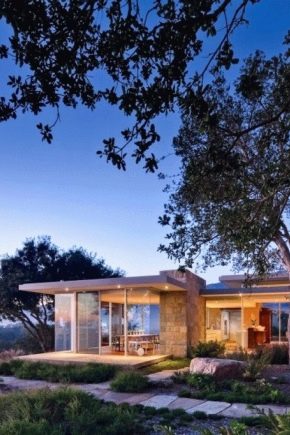
Residents of the post-Soviet space steadfastly associate a flat roof with multi-storey typical buildings. Modern architectural thought does not stand still, and now there are many solutions for private houses and cottages with a flat roof that look no less interesting than pitched structures.
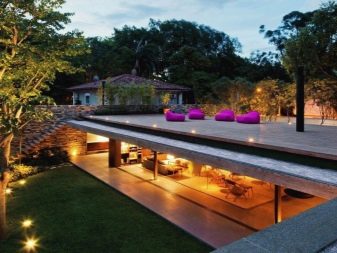
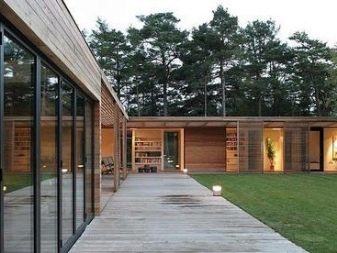
Peculiarities
The one-storey house with a flat roof has a stylish and modern look. Basically, such designs are stylized in a special way, choosing the directions of minimalism or high-tech. Traditional styles for buildings with such a roof will not work, since such roofs have been properly beaten quite recently, therefore, any of the classic directions will look ridiculous here.
Of particular interest is how exactly the roof will be used: either for its intended purpose, or as an additional open tier-terrace. It is necessary to decide in advance on this issue in order to correctly draw up a project plan.
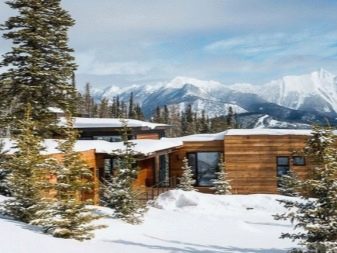
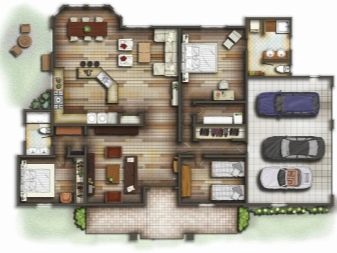
Materials (edit)
Various materials are used for the construction of 1-storey flat-roof cottages, but it should be borne in mind that not all of them are suitable for the Russian climate. In winter, a large amount of snow falls on almost the entire territory of Russia, which greatly increases the load on a flat roof. Therefore, walls cannot be made of lightweight and insufficiently strong materials. In this regard, popular frame buildings will not work, but there is another pre-fabricated option.
There are different materials for floors and walls. If almost all durable types (monolith, brick, wood) are suitable for the walls, then for the roof you will have to choose the type of construction raw materials more carefully.
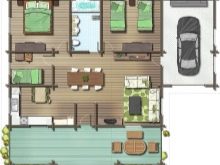
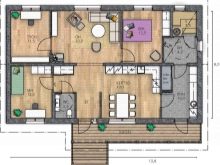
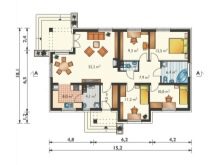
Reinforced concrete slabs
Hollow or flat reinforced concrete slabs are used in modern construction for floor slabs. They are strong enough to support the weight of a flat roof.
Plates have many positive qualities:
- durability;
- durability;
- good sound and heat insulation characteristics;
- quick installation;
- resistance to corrosive phenomena.
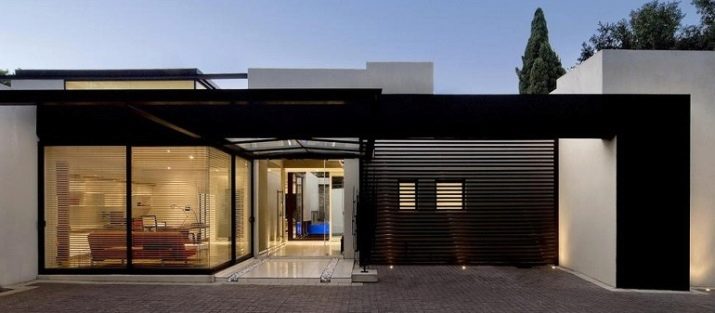
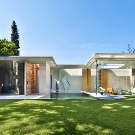
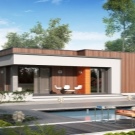
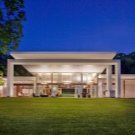
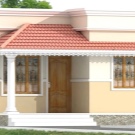
The main disadvantage of the material is that it is produced only in standard sizes, this must be taken into account even when creating a project. Reinforced concrete slabs are suitable for floors only in a house that has a reinforced foundation.
Corrugated board
For floors, a special corrugated board is used, which is called carrier. As with the previous version, it is perfect for installation as a flat roof. Bearing corrugated board is very popular mainly because of its low cost. This material costs significantly less than all the others. However, the low price did not prevent it from establishing itself as a durable and versatile material that has an excellent ability to withstand the heavy loads that a flat roof is subjected to.
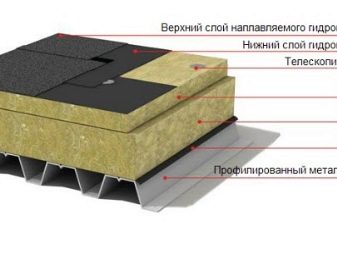
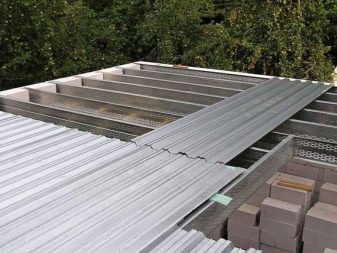
The load-bearing corrugated board weighs much less than reinforced concrete slabs, therefore it is optimal for creating flat roofs in the middle climatic zone with little rainfall in winter.
Monolithic concrete
This material is rarely used for floors due to the complexity of installation. Here you first need to prepare the mixture, after which you can pour.Only true professionals can do this. However, it should be noted that monolithic concrete as a flat roof is perfectly exploited, but only on condition that the manufacturing and installation technology has been fully followed.
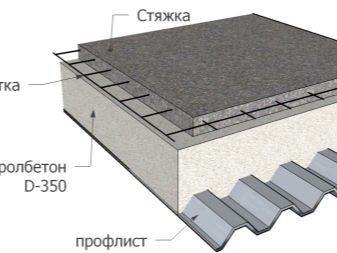
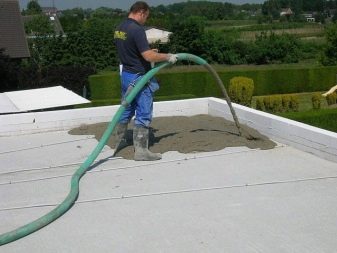
It is not customary to build modern one-story houses with a flat roof from traditional materials. For this, modern designs are best suited, which can withstand both the harsh winter and summer heat. At the same time, it is easy to work with them, and the construction itself does not take much time.
SIP or sandwich panels
In the catalog of every self-respecting construction agency there are standard projects of one-story houses with a flat roof made of SIP panels. Please note that it is best to order cottages made of this material. Construction requires adherence to a special technology, so it can be difficult for a beginner to work with sandwich panels.
Speaking about the advantages of panel houses, we can note their low thermal conductivity and high noise insulation characteristics. Construction costs much less than brick. At the same time, the rejection of the pitched roof also plays a significant role.
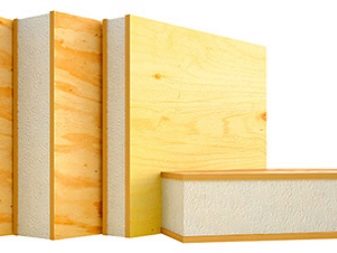
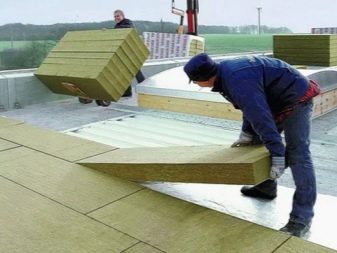
Flat roof
We are all used to seeing flat roofs only in Soviet-built multi-storey buildings. There is an opinion among many that such roofs are boring, and a real house should only be equipped with a pitched roof. In the light of recent architectural developments, this belief can be argued, especially when you consider the many advantages of such roofs.
It is impossible not to make a reservation that one-story houses with a flat roof can only be stylized in a modern direction. The flat roof itself looks futuristic, and you need to use this free space.
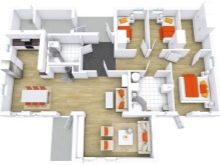
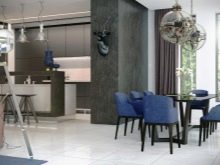
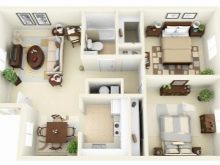
Advantages
Among the advantages of flat roofs are many characteristics.
- Ease of installation. Flat roof structures can be completed in record time.
- Reliability. If you organize your roof in the right way, it can support a lot of weight. Moreover, in which case, repairing such a structure is much easier than repairing the rafter system.
- Excellent thermal insulation. Regardless of what type of flat roof structure was chosen, it will perfectly retain heat inside the house.
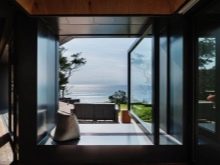
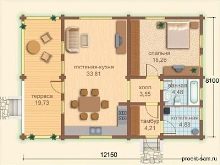
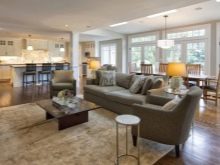
- Cheapness. Compared to pitched ones, flat constructs are much cheaper both in terms of materials and in terms of time.
- Easy to install equipment. Antennas, air conditioners, various service communications on a plane are much easier to place than on a slope.
- Interesting view. If the house itself is decorated in the style of "minimalism", then a laconic roof without a slope will perfectly complement the overall look.
- Additional area. If desired, the roof can be reinforced and used to organize space for a playground, garden or recreation area. Some even make a swimming pool here.
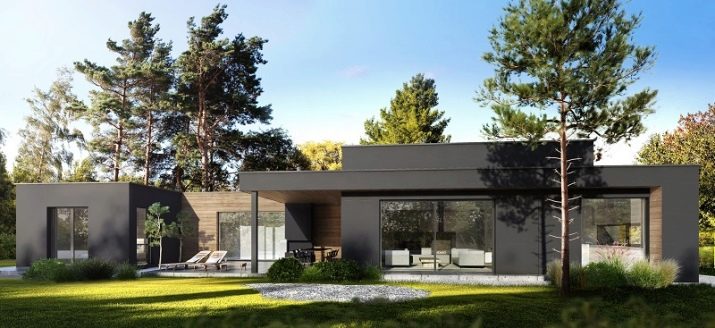
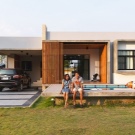
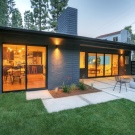
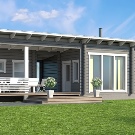
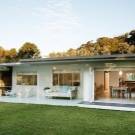
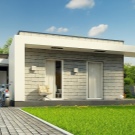
disadvantages
There are not so many disadvantages, but they are still there.
- As good as the roof is, there is always a chance that it will leak. In the case of a flat structure, the risk increases many times over, because it is subject to heavy loads due to the fact that the snow does not roll.
- If you plan to use the cover for your needs in the winter, the snow and ice will have to be cleaned manually.
- The erection of a roof of a flat sample must be carried out in full compliance with the technology, otherwise there is a risk that it will leak or not withstand the loads and collapse.
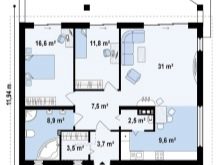
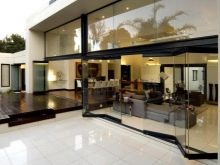
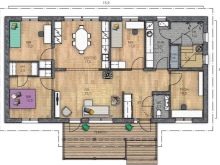
Varieties
Non-pitched roofs are divided according to several criteria, including the method of use and the type of laying of materials. As a rule, the name of each of the characteristics speaks for itself.
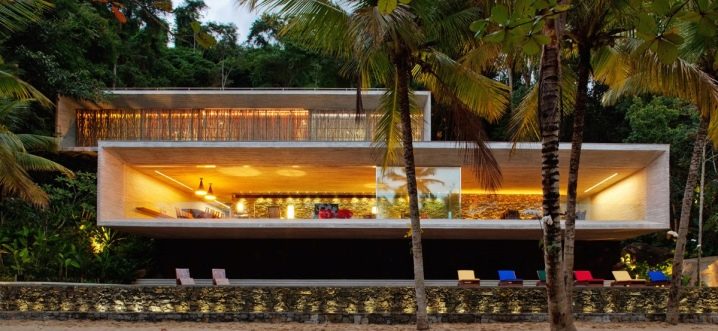
By way of use
Roofs are operated and unexploited.
Operated roofs are those that are used not only as roofs, but also as additional space for pastime.Reinforced systems are used here, allowing not only to place heavy equipment on the roof, but even to organize a "green corner" here, planting a lawn, flowers and even trees. Equipping a structure of this type costs quite a lot, while it is important to lay down in advance in the project what weight load the roof will be subjected to.

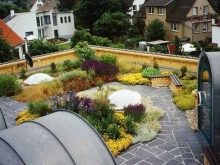
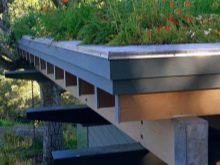
Unused roofs are much cheaper due to the fact that they do not need to be additionally reinforced and equipped with waterproofing. The only thing you need to pay attention to is the snow loads that the roof will be exposed to in winter.
Walking on such roofs is usually not recommended, so everything must be calculated so that the roof can withstand the snow layer without periodically cleaning it.
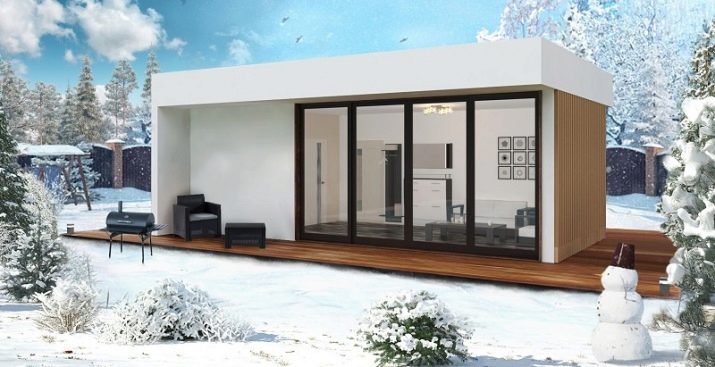
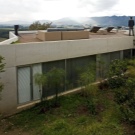
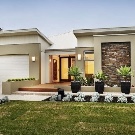
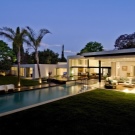
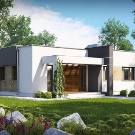
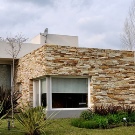
By type of stacking materials
A distinction is made between classic, inversion and breathable roofs.
Classic types are usually used in the design of unexploited roofs. This is due to the fact that they have a lower coefficient of resistance to loads. Moisture or mechanical stress can be detrimental to these roofs.
The layout of the layers looks like this (from top to bottom):
- top surfaced material (waterproofing);
- bottom material to be welded (waterproofing);
- screed (if provided);
- insulation;
- vapor barrier layer;
- overlap.
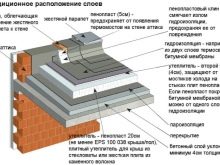
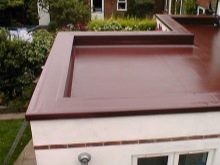
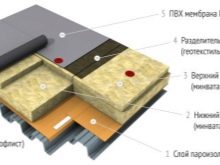
Thus, an unprotected waterproofing layer quickly deteriorates.
The inverted roof looks exactly the opposite, which can be understood from the name:
- ballast (gravel, crushed stone or other heavy material);
- vapor barrier;
- hydrophobic insulation;
- waterproofing;
- protective substrate (primer);
- overlap.
These flat roofs have a long service life and are ideally suited to the roofs in use.
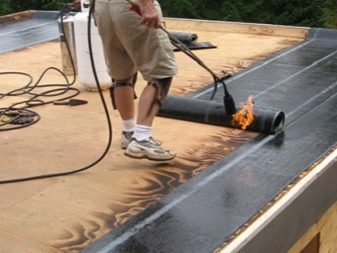
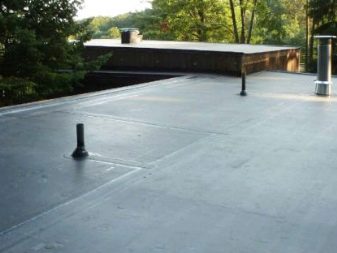
Breathers can be both classic and inversion designs. They are equipped with aerators or deflectors to provide additional ventilation, because there is no gap between the flat roof and the house, as is the case with pitched roofs. This leads to insufficient air exchange, which is why the organization of the ventilation system is so important.
Project
When drafting a one-story house with a flat roof, it is extremely important to pay close attention to the type of roof. Here, the roof is the most important component. Russian firms have been engaged in such design not so long ago, so contact only trusted agencies.
This is one of the rare cases when only professionals should do a project. You, in turn, can only independently work out the layout of the rooms, and also indicate exactly how you plan to operate the roof and whether you plan at all. This will determine what foundation will be laid, from which the bearing walls will be made.
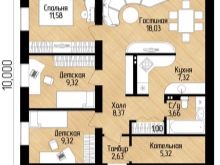
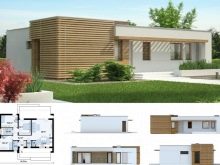
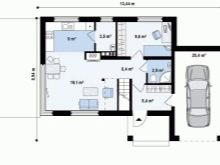
Beautiful examples
Examples of beautiful one-storey houses, realized according to professionally designed projects, are presented in the photo gallery.
- A flat roof is not always usable. Sometimes it is used only as part of an overall design concept. Note the characteristic feature of all flat roofs: they all have parapets.
- The one-story house in a modern style fits perfectly into the minimalistic surrounding landscape. Despite the fact that many consider such houses to be "boxes", it cannot be denied that they look interesting and original.
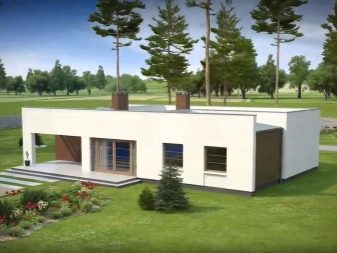
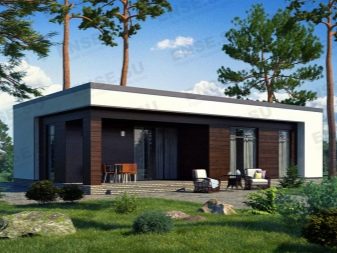
- Almost anything can be arranged on the roof of a one-story flat-roofed house. By breaking up the lawn meadow, the owners made the house a part of the surrounding landscape, while emphasizing the eco-friendly style.
- An interesting project of a one-story house with a garage will appeal to the owner of several cars. When the need arises to place them, a garage is what you need. The space allocated for the construction of the extension can be compensated by organizing a roof terrace.
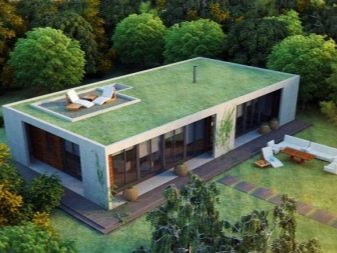
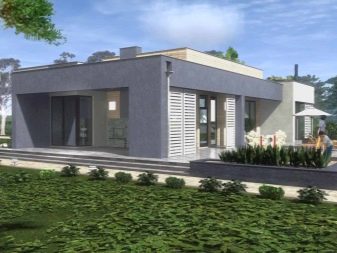
- The cheapest of all one-story flat-roofed houses look really boring, but it is worth remembering about their cost, which compensates for the inexpressive appearance. As a rule, the price of such a house is 3-4 times less than for a small cottage with a pitched system. For greater savings, solar panels can be placed on the roof.
- The wooden-brick house looks modern and traditional at the same time, a bit country-style. This was achieved by using darker finishing materials for the roof than for the entire house. Thanks to the flat roof, the house looks more airy than if a pitched structure was used.
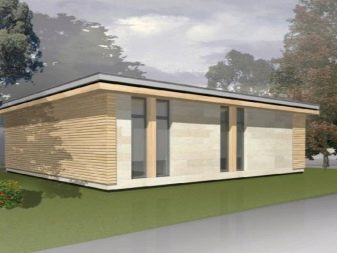
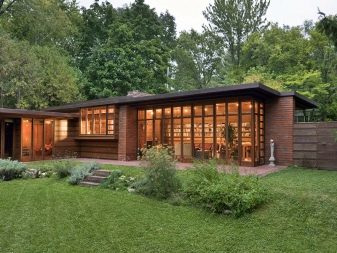
In this video, we will focus on the construction of a flat roof for a one-story house.













The comment was sent successfully.